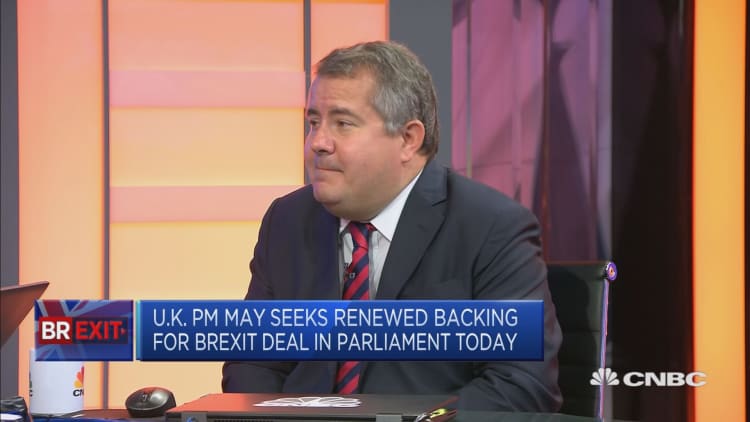
The United Kingdom's growth rate will likely fall below the central bank's forecast this year, according to one economist, who believes that interest rates could also be cut if Brexit talks continue to head south.
Speaking to CNBC's "Squawk Box Asia" Monday, ING's chief economist and head of research for Asia-Pacific based these predictions on the state of the current negotiations between Britain and the EU, and how the U.K. economy is "looking quite bad on all fronts."
"(Growth of less than 1.2 percent) looks pretty likely, judging just by the way that the economy seems to finally be waking up to what's about to happen to it. Consumers are sort of retrenching, the housing market is looking dismal, business investment isn't really happening," said Rob Carnell.
The Bank of England sharply downgraded its 2019 economic outlook to 1.2 percent last week. As recently as November, the Bank had projected growth of 1.7 percent this year.
"I think there's a case for a (rate) cut later this year were things to really seriously deteriorate in the face of a bad Brexit deal ... (a) bad Brexit deal basically being any deal that took us out of the EU, in my personal view," Carnell added.
The Brexit impasse continues to drag as Prime Minister Theresa May struggles to negotiate a deal with both the U.K. Parliament and her European counterparts.
Later Thursday, the U.K. leader and lawmakers will be in Parliament to debate the next steps for the Brexit process, as the March 29 deadline for the country to leave the European Union draws closer.
But for Carnell, although the current Brexit situation is "just downright awful" for the U.K. economy, he expects that the country will eventually pick up.
"On an economic basis, this is just downright awful. Perhaps not apocalyptic — and in time we'd find a way to come out of this and make something of it — but it's clearly not something I'll be voting for with my heart or my wallet," he said.
If there really was a bad Brexit deal, however, the pound is likely to weaken to provide a "safety net" for the U.K. economy, Carnell said. "It's only through a substantially weaker currency that you might be able to push the export sector hard enough to offset some of the damage," he noted.

